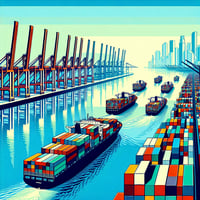No rest for the weary at PAXAFE’s booth, LogiPharma 2025 PAXAFE just wrapped up another LogiPharma...
The Role of AI in Enhancing Operational Efficiency for Perishable Shippers

In the fast-paced world of perishable goods shipping, operational efficiency is not just a goal—it's a necessity. From farm-fresh produce to delicate pharmaceuticals, these goods demand meticulous handling and swift delivery to ensure they reach consumers in optimal condition. The inherent challenges of short shelf life, temperature sensitivity, and the risk of spoilage make this sector particularly demanding.
This is where Artificial Intelligence (AI) steps in as a game-changer. With its ability to analyze vast amounts of data, predict trends, and automate complex processes, AI offers a powerful toolkit for perishable shippers to streamline operations, minimize losses, and enhance overall efficiency. From optimizing routes and predicting demand to monitoring temperature and ensuring quality control, AI is revolutionizing how perishable goods are transported and managed. In this blog post, we delve into the specific challenges faced by perishable shippers and explore the multifaceted role of AI in overcoming these hurdles, ultimately paving the way for a more sustainable and profitable future.
Challenges Faced by Perishable Shippers
Perishable goods, encompassing a wide array of items from fresh produce and seafood to flowers and pharmaceuticals, share a common characteristic: their susceptibility to spoilage and degradation over time. This inherent vulnerability poses a unique set of challenges for shippers, who must navigate a complex landscape to ensure these delicate products reach their destination in prime condition.
- The Ticking Clock: The short shelf life of perishable goods necessitates a race against time. Even minor delays in transit can lead to significant losses due to spoilage, rendering entire shipments worthless.
- Temperature Tango: Maintaining precise temperature and humidity levels throughout the journey is paramount. Fluctuations can accelerate deterioration, compromising product quality and safety.
- The Spoilage Spectre: The risk of spoilage looms large, threatening financial losses and damaging brand reputation and customer trust.
- Supply Chain Maze: The intricate nature of perishable goods supply chains involving multiple stakeholders and transportation modes adds another layer of complexity. Coordinating seamlessly across this network is crucial to avoid disruptions and delays.
- Demand & Inventory Dance: Accurately forecasting demand and managing inventory levels is a delicate balancing act. Overstocking leads to waste, while understocking results in missed sales opportunities.
These intertwined and often unpredictable challenges necessitate a proactive and adaptive approach to perishable goods shipping. In an industry where time is of the essence, and margins are thin, operational efficiency becomes not just a competitive advantage but a matter of survival.
AI Applications in Perishable Goods Shipping
Artificial Intelligence is ushering in a new era of operational efficiency for perishable shippers, offering innovative solutions to address long-standing challenges. Let's explore some key AI applications that are transforming the landscape:
Demand Forecasting and Inventory Management
- Predictive Power: AI algorithms can analyze historical sales data, seasonality, weather patterns, and social media trends to generate accurate demand forecasts.
- Optimized Inventory: Armed with these predictions, shippers can optimize inventory levels, reducing the risk of overstocking and minimizing waste.
- Seamless Fulfillment: AI also streamlines order fulfillment, ensuring that the right products are available at the right time to meet customer demands.
Route Optimization and Real-time Tracking
- Efficient Routing: AI-powered algorithms consider factors such as traffic conditions, weather forecasts, and delivery deadlines to dynamically optimize routes, reducing transit time and fuel consumption.
- Shipment Visibility: Real-time tracking systems, coupled with AI analytics, provide continuous visibility into shipment location and condition, enabling proactive interventions in case of delays or temperature deviations.
Temperature Monitoring and Predictive Maintenance
- Smart Sensors: IoT sensors embedded in shipping containers continuously monitor temperature and humidity, transmitting data to AI systems for real-time analysis.
- Proactive Control: AI algorithms can detect minor deviations and trigger corrective actions, such as adjusting refrigeration settings or alerting personnel.
- Equipment Uptime: AI-powered predictive maintenance anticipates equipment failures before they occur, allowing for timely repairs and minimizing downtime.
Quality Control and Inspection
- Visual Inspection: AI-powered image recognition technology can rapidly inspect perishable goods for defects, contamination, or other quality issues.
- Early Detection: This enables early detection and removal of compromised products, ensuring that only high-quality goods reach consumers.
Working in concert, these AI applications offer a comprehensive solution to the challenges perishable shippers face. By leveraging the power of data and intelligent algorithms, AI empowers shippers to make informed decisions, streamline operations, and ultimately deliver perishable goods in optimal condition, boosting customer satisfaction and driving business growth.
Case Studies of Successful AI Implementation
Real-world examples illustrate the transformative impact of AI in perishable goods shipping. Here are a couple of notable case studies:
Case Study: Robinson Fresh
Robinson Fresh, a leading produce supplier, faced the challenge of optimizing its complex supply chain to minimize waste and ensure freshness. They implemented an AI-powered platform that analyzes data from various sources, including weather patterns, harvest schedules, and transportation logistics. This allows them to accurately predict demand, adjust inventory levels, and dynamically optimize routes, significantly reducing spoilage and improving product availability.
Case Study 2: Ocado
Ocado, an online grocery retailer, uses AI-powered robots to automate warehouse operations, including picking and packing perishable goods. This has led to increased efficiency, reduced labor costs, and improved order accuracy. Additionally, AI algorithms analyze customer data to personalize product recommendations, leading to higher sales and customer satisfaction.
These success stories demonstrate the tangible benefits that AI can bring to perishable shippers. By embracing AI technologies, companies can gain a competitive edge, enhance operational efficiency, and deliver superior products to consumers, all while minimizing waste and promoting sustainability.
Benefits of AI for Perishable Shippers
The integration of AI into perishable goods shipping offers a plethora of advantages that extend beyond mere operational improvements. It's a catalyst for comprehensive transformation, impacting various aspects of the business.
Cost Reduction and Profitability
- Waste Minimization: AI's predictive capabilities enable accurate demand forecasting and inventory optimization, significantly reducing spoilage and waste.
- Optimized Logistics: Intelligent route planning and real-time tracking minimize transit time and fuel costs, leading to substantial savings.
- Predictive Maintenance: AI-powered maintenance prevents costly equipment breakdowns and extends the lifespan of assets, optimizing resource allocation.
Enhanced Efficiency and Productivity
- Streamlined Operations: AI automates numerous routine tasks, freeing up human resources to focus on strategic initiatives.
- Data-driven Decisions: Real-time data and AI analytics empower shippers to make informed decisions swiftly and proactively adapt to changing circumstances.
- Improved Coordination: Enhanced visibility across the supply chain facilitates better stakeholder collaboration, minimizing delays and disruptions.
Quality and Customer Satisfaction
- Superior Product Quality: AI-enabled temperature control and quality inspections ensure that perishable goods reach consumers in optimal condition.
- Customer Delight: Timely deliveries and consistent product quality foster customer trust and loyalty, driving repeat business.
Sustainability and Waste Reduction
- Reduced Spoilage: AI's ability to minimize spoilage directly contributes to waste reduction, promoting environmental sustainability.
- Optimized Routes: Efficient route planning reduces fuel consumption and carbon emissions, furthering Eco-friendly practices.
Competitive Advantage
- Agility and Adaptability: AI empowers shippers to respond swiftly to market fluctuations and unforeseen disruptions, gaining a competitive edge.
- Innovation and Differentiation: Embracing AI showcases a commitment to innovation and positions companies as leaders in their field.
AI offers a holistic solution for perishable shippers, enabling them to navigate the industry's complexities more confidently and efficiently. It's not just about surviving but thriving in a competitive landscape, ensuring profitability, sustainability, and customer satisfaction.
Challenges and Considerations
While AI's potential benefits in perishable goods shipping are immense, it's important to acknowledge the challenges and considerations accompanying its adoption.
- Implementation Costs: Integrating AI technologies into existing systems can involve significant upfront software, hardware, and infrastructure investments.
- Data Security & Privacy: The collection and analysis of large volumes of data raise concerns about data security and privacy breaches. Robust measures need to be in place to safeguard sensitive information.
- Skilled Personnel: Implementing and managing AI systems often requires specialized skills and expertise. Companies may need to invest in training or hire new talent.
- Change Management: Introducing new technologies and processes can be met with resistance from employees. Effective change management strategies and training programs are essential for successful adoption.
These challenges, while real, should not deter perishable shippers from exploring the potential of AI. With careful planning, strategic investments, and a focus on change management, the rewards of AI adoption can far outweigh the initial hurdles. Moreover, as AI technologies continue to mature and become more accessible, the barriers to entry are likely to diminish.
It's crucial for shippers to approach AI implementation with a clear strategy, defining their objectives, identifying suitable technologies, and allocating resources effectively. Collaborating with experienced AI vendors and consultants can provide valuable guidance and support throughout the journey.
The Bottom Line
The journey of perishable goods from farm to table is fraught with challenges, demanding meticulous attention and swift action. AI emerges as a beacon of hope, offering transformative solutions to enhance operational efficiency, minimize losses, and ensure product quality throughout the supply chain. From intelligent demand forecasting to real-time tracking, AI is reshaping the landscape of perishable goods shipping, driving sustainability, profitability, and customer satisfaction.
The convergence of AI and the perishable goods industry is a technological advancement and a paradigm shift. By embracing AI, shippers can unlock a world of possibilities where data-driven insights and automation create a seamless, optimized, and resilient supply chain. It's a journey towards the future.





